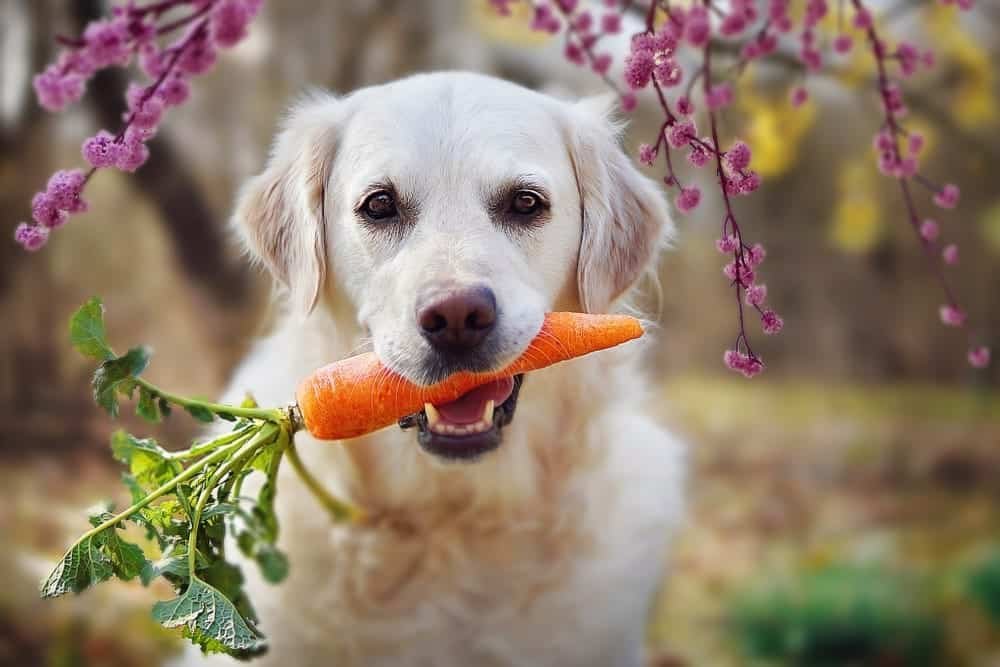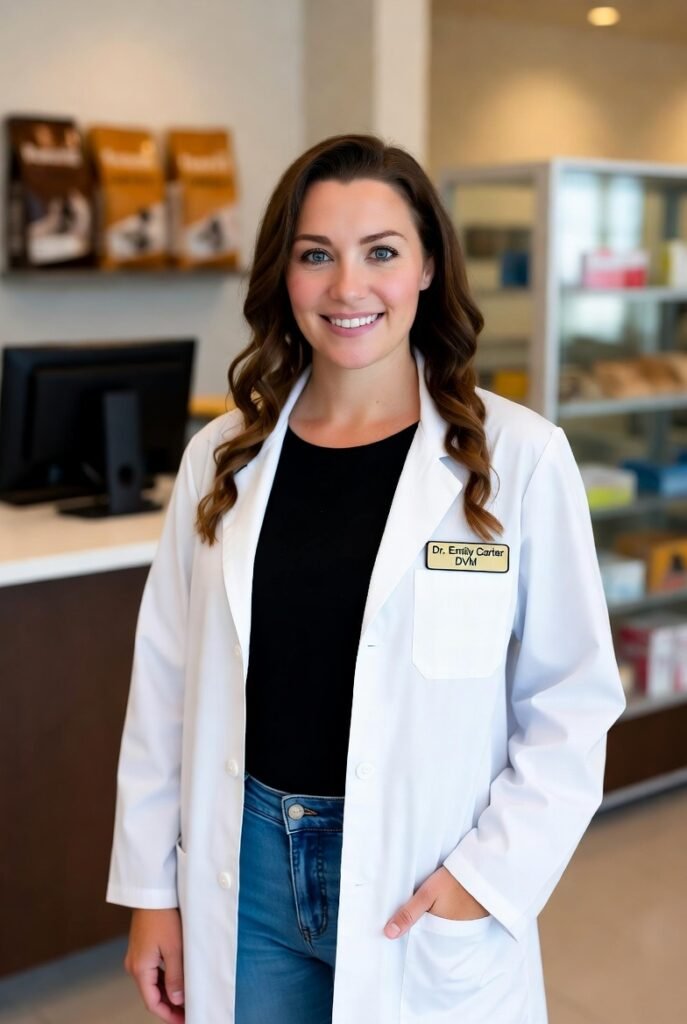When my Beagle-Lab mix, Max, crunched a baby carrot from my Whole Foods bag, I called my Seattle-based vet, Dr. Emily Carter, to confirm it was safe. She assured me carrots are a fantastic, low-calorie treat, offering dental and digestive benefits, but overfeeding can cause mild issues. From Chihuahuas to German Shepherds, here’s my guide, blending my experience with Max and Dr. Carter’s expertise, to help dog owners use carrots safely.
Can Dogs Eat Carrots?
Yes, says Dr. Carter. Carrots (~3.6g fiber/100g, ~4 kcal/baby carrot) are safe and nutritious for Labs, supporting dental health and digestion. Max loves them raw [web:10][1].
What Are the Health Care Benefits of Carrots for Your Dog?
Dr. Carter details (per 100g, raw carrots):
- Fiber: ~3.6g, aids digestion in Yorkies.
- Vitamin A (Beta Carotene): ~16706 IU, supports vision and immunity in Beagles.
- Vitamin K: ~13.2µg, aids clotting in Labs.
- Potassium: ~320mg, supports muscles in German Shepherds.
- Antioxidants: Lutein reduces inflammation in Chihuahuas.
Benefits include:
- Dental Health: Chewing scrapes plaque in Labs, not a cure for dental disease.
- Digestive Health: Fiber regulates stools in Pugs.
- Eye Health: Beta-carotene supports vision in Beagles.
- Low-Calorie: Ideal for overweight Labs (~41 kcal/100g).
- Immune Support: Antioxidants reduce inflammation, no proven cancer prevention.
Max’s teeth shine from carrots [web:18][2].
Can Dogs Eat Carrots Every Day?
Yes, says Dr. Carter. Daily carrots are safe for Beagles in moderation (<10% daily calories). Overfeeding risks digestive upset in Pugs. Max gets them daily [web:10][3].
How Many Carrots Can Your Dog Eat?
Dr. Carter’s guidelines (daily, <10% daily calories):
- Small Dogs/Puppies (e.g., Chihuahua, 5–10 lbs): 1–2 baby carrots (~10–20g, ~4–8 kcal).
- Medium Dogs (e.g., Beagle, 15–39 lbs): 2–4 baby carrots (~20–40g, ~8–16 kcal, Max’s limit).
- Large Dogs (e.g., German Shepherd, 40+ lbs): 4–6 baby carrots (~40–60g, ~16–24 kcal).
Cut into small pieces to prevent choking in Chihuahuas. Max gets three [web:18][1].
How Much Is Carrot Too Much for Your Dog?
Dr. Carter warns overfeeding (>10 carrots/day) risks:
- Digestive Upset: Gas or diarrhea in Pugs from high fiber.
- Skin Discoloration: Rare orange tint in Labs from beta-carotene overload, harmless.
Max sticks to moderation [web:10][2].
Can Dogs Eat Raw Carrots?
Yes, says Dr. Carter. Raw carrots (~3.6g fiber/100g, e.g., Grimmway Farms) retain nutrients and clean teeth in Beagles. Wash and cut into small pieces for Yorkies. Max loves the crunch [web:18][3].
Can Dogs Eat Carrots with Peas?
Yes, says Dr. Carter. Plain peas (~5.7g fiber/100g) and carrots are safe for Labs, offering vitamins and fiber. Avoid canned peas (high sodium, ~300mg/100g). Max enjoys this mix [web:10][1].
Can Dogs Eat Carrot Cake?
No, says Dr. Carter. Carrot cake (~15g sugar/100g, e.g., homemade) risks obesity or pancreatitis in Beagles due to sugar and fat. Raisins or walnuts are toxic. Tiny plain bites may be okay for Labs. Max skips it [web:18][2].
Can Dogs Eat Carrot Greens?
Yes, sparingly, says Dr. Carter. Carrot greens (~2.9g fiber/100g) are nutrient-rich but rare in commercial foods. Wash thoroughly for Chihuahuas; excess risks upset. Max gets a pinch [web:10][3].
Can Dogs Eat Yellow Carrots?
Yes, says Dr. Carter. Yellow carrots (~3.6g fiber/100g) offer similar benefits to orange ones for Beagles, with no proven 70% cancer risk reduction. Max likes both [web:18][1].
Can Dogs Eat Carrots with Broccoli?
Yes, says Dr. Carter. Broccoli (~2.6g fiber/100g) in small amounts (<5% daily intake) is safe with carrots for Labs, aiding immunity. Excess risks gas in Pugs. Max enjoys this combo [web:10][2].
Can Your Dog Drink Carrot Juice?
Yes, sparingly, says Dr. Carter. Carrot juice (~1g fiber/100g with pulp) offers vitamin A but lacks fiber unless pulp is added. Small sips for Beagles, avoid store-bought (e.g., Bolthouse Farms) with additives. Max prefers whole carrots [web:18][3].
Can Dogs Eat Carrot Cake with Walnuts?
No, says Dr. Carter. Walnuts (~6.7g fat/100g) risk pancreatitis or toxicity in Labs. Plain carrot cake in tiny amounts is safer for Beagles. Max avoids it [web:10][1].
What to Do If Your Dog Eats Carrots?
Dr. Carter’s steps for Max:
- Small Amount, Plain: Monitor for 24 hours for gas in Pugs.
- Toxic Ingredients (e.g., Carrot Cake with Raisins): Call vet or ASPCA Poison Control (888-426-4435).
- Symptoms: Watch for diarrhea, choking (2–12 hours) in Labs.
- Vet Care: May need fluids or imaging for blockages in Beagles.
Max’s carrot snack was safe [web:18][2].
Safe Alternatives
Dr. Carter recommends:
- Veggies: Green beans or pumpkin for Yorkies.
- Fruits: Blueberries or apples for Labs.
- Dog Treats: Low-calorie chews (e.g., Zuke’s, at Petco).
Max loves green beans [3].
FAQs
- Are Carrots Safe? Yes, daily in moderation.
- Can Dogs Eat Carrot Cake? No, risks sugar/fat toxicity.
- Can Dogs Eat Greens? Yes, sparingly, washed.
- What If My Dog Eats Toxic Cake? Call vet immediately.
- Safe Treats? Veggies, fruits, or dog chews.
Key Takeaways
- Carrots Safe: Raw or cooked, in moderation.
- Avoid Toxic Cakes: Risks obesity, toxicity.
- Small Portions: Prevent digestive upset.
- Safer Snacks: Veggies, fruits, or dog treats.
Final Thoughts
Max’s carrot obsession taught me they’re a crunchy, healthy treat, thanks to Dr. Carter’s advice. Dog owners can find carrots at Whole Foods or Grimmway Farms products but should prepare them properly for any breed, from Pomeranians to Mastiffs. Choose safe treats, monitor for symptoms, and consult your vet for a healthy pup!
References:
[1] PetMD, “Foods Safe for Dogs”.
[2] AKC, “Dog Nutrition Guide”.
[3] AVMA, “Pet Food Safety”.

